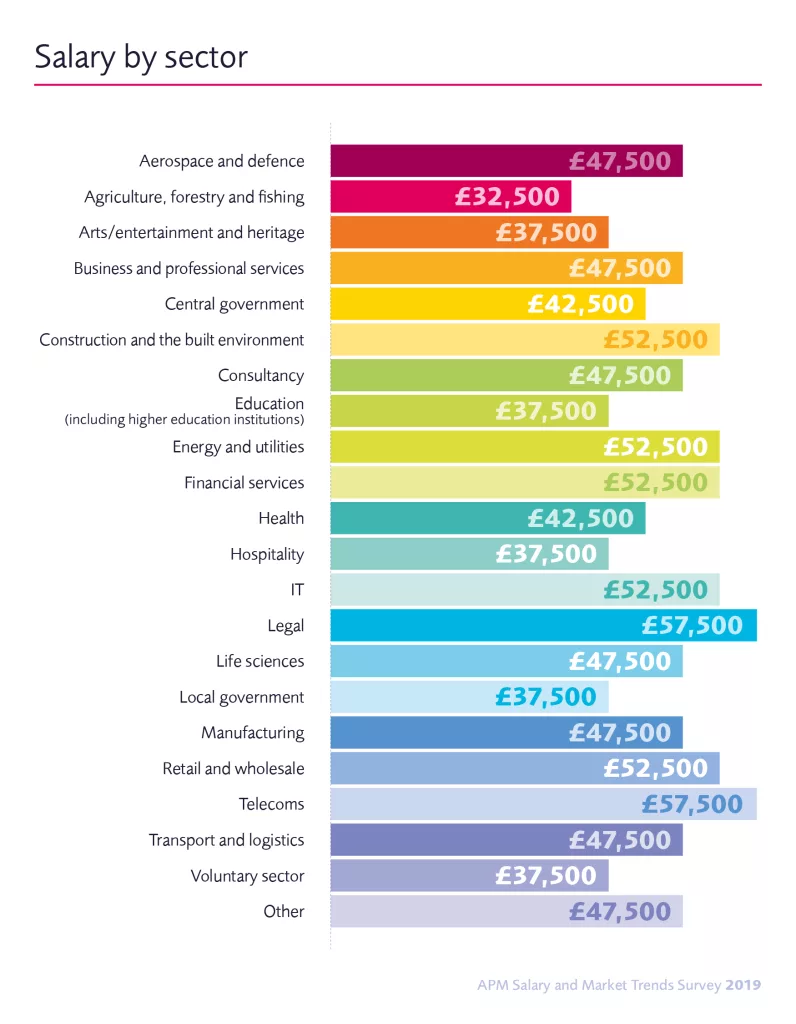Survey Reveals Positive Outlook for Project Professionals

The findings of the latest annual ‘Salary and Market Trends Survey’ from the Association for Project Management (APM), the chartered professional body for the project profession, suggests that the future of project management is bright – with nearly eight out of ten (77 per cent) optimistic about the supply of jobs within the profession over the next five years, and nearly as many expecting pay increases in the next year (70 per cent). Organisational growth was found to be at its highest level since 2015, with 69 per cent stating that their company was expanding and nearly half (49 per cent) of participants citing their employer was currently taking on more staff. The research, commissioned by APM, saw YouGov survey more than 4,600 project professionals across the UK and reveals positivity across the profession. This is encouraging considering that less than one in four respondents believe that prospects are excellent or good for the UK economy over the next 12 months – with a further 44 per cent expressing a negative opinion. It suggests that project management is a highly sustainable and financially rewarding career, whatever the economic or political weather pattern. Younger project professionals (and project professionals-to-be) were particularly positive with 78 per cent of 18-24 year olds rating their own economic prospects as either ‘excellent’ or ‘good’. There were some signs of good news regarding balance in gendered pay too – with men now earning 24 per cent more than women in 2018, compared to 30 per cent in 2017. Certainly not an even balance, but a positive trend that APM are keen to help continue. Findings also reveal that the average salary for a project professional now stands at £47,500 with the highest paid being those based in London or outside the UK (both have an average of £52,500), and within the legal and telecoms sector (both with average salaries of £57,500). Debbie Dore, Chief Executive of APM said: “Taking the pulse of the profession through our salary survey is incredibly important for APM, and the insights we uncover help ensure that we act and advocate for our members and stakeholders appropriately at all times.” She continues “This year the ‘weather-proof’ nature of the project profession came through loud and clear, suggesting that despite potentially stormy economic conditions, project management is a confident and optimistic profession that businesses recognise contributes greatly to their future success. By continuing to support the profession with a suite of opportunities for professional development, knowledge share formal qualifications and standards, we hope to help sustain this positivity further.” One of the keys to the sustainability of the profession as identified by recipients, was the embracing of all things digital. 87 per cent saw innovations in technology having the biggest impact on the way projects were managed in the near future while political instability (64 per cent) and Brexit (62 per cent) were also seen as significant global trends. Reviewing the entirety of the survey findings APM’s Chief Executive Debbie Dore said: “It’s clear from these latest findings that the investments made in professional development both by individuals and organisations have helped to ensure that project management remains a highly attractive and well reimbursed career, that is built to go from strength to strength.” Manufacturing & Engineering Magazine | The Home of Manufacturing Industry News
Health and Safety Culture Needed on a Sector-wide Basis

International market research firm, YouGov, has found that nearly two thirds of senior executives and decision-makers of SMEs find it hard to invest in health and safety because of policy barriers. Businesses also complained at constraints in time and cost though principally targeted the distinct lack of a health and safety culture when it comes to commerce. The research, carried out on behalf of Seton, one of the worldâs leading manufacturers and distributors of health and safety and facilities management solutions, found that 20% of employers thought that there was too much emphasis on government policy and regulation and that compliance was was an exercise in hoop-jumping rather than proper conduct. As a result, 13% of employers also said that their employees were reluctant to follow procedures in place. A somewhat alarming fifth of senior executives and decision-markers insisted that it just wasn’t that important in their particular industry. Of those deploring the significance of health and safety were businesses in the construction industry despite the sector being characterised by high levels of risk in terms of long-term occupational health and one-off injury (or lost time accidents). One in every ten construction worker asked said health and safety was not that important. Various businesses have stepped forward to assert their opposition to the findings of the report and express their support for health and safety â in practice and policy. Stephen Thomas, Health and Safety Technical Consultant at Croner Solutions insisted that it must be considered a core business issue from which businesses stand to gain. He also corroborated the suggestions made by YouGovâs survey, advising that invoking a culture was less about form-filling and bureaucracy and more about identify real-life risks and being proactive in mitigating those risks. He added that such an approach need not be costly and that, by improving health and safety awareness and practice, businesses would also find they were more efficient and more productive. Not only could companies spend less time fearing HSE audits or retribution, but they would also benefit from a more motivated team, less inclined to take absence. With the benefits laid out for all to see, it surely canât be long until a positive health and safety culture is the rule and not the exception.


